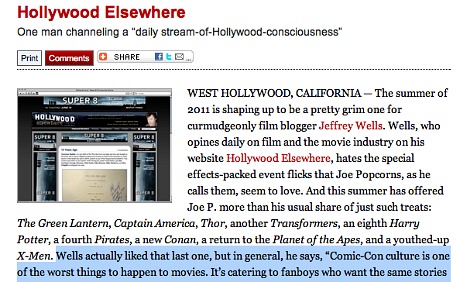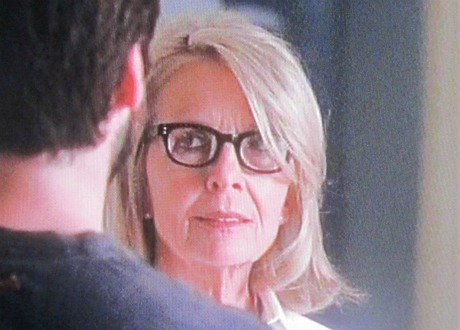I’m not saying that Renny Harlin‘s 5 Days of War (which recently opened in London and non-American Georgia as 5 Days of August) is strongly or somewhat reminiscent of Elie Chouraqu‘s Harrison’s Flowers (2000) or Steven Silver‘s The Bang-Bang Club, but similarities do seem pronounced.
Month: June 2011
Not Her Place
This is going to sound funny, but there are actresses and other very attractive women who easily or naturally associate with the beach-blanket bikini bingo world, and there are those who personality-wise or spiritually-speaking don’t quite seem to belong in that realm. Emma Stone, no offense, belongs in the latter category. She’s all about spirit, eyes, pizazz, snap. And she’s not a blonde. And The Help looks like trouble.

Lure
If anyone has a copy of Diablo Cody‘s Lamb of God, a script about a young conservative woman who visits Las Vegas, please pass along. It was reported yesterday that Cody will direct the film (possibly later this year) with Mason Novick producing.
9:51 pm Update: I was sent a copy a couple of hours ago and have skimmed through it. That Michael Fleming logline about the main character, who’s literally named Lamb, being a Christian who turns to stripping is incorrect. It is, however, a moral tale about a Christian girl among the hapless heathens. The Vegas strip but no stripping, Cheetah Club, cash gifts, a dead fiance, a skin graft, Vicodins, etc. A well-written, sometimes sassy but more often plain-spoken drama about sins, values, generosity, growth.
Smith Has It, Reynolds Doesn't
In a piece called “The Movie Star,” Grantland‘s Bill Simmons, the sports guy who writes brilliantly about movies every time he steps up to the Hollywood plate, says there are 24 male movie stars right now. The article is basically a two-parter that compares the careers of Ryan Reynolds vs. Will Smith, and how the latter is perhaps the only real movie star around and why Reynolds, for all his likability, good looks and talent, may never get there.
The Big 24, he says, are “Will Smith, Leonardo DiCaprio, Johnny Depp, Tom Cruise, George Clooney, Matt Damon, Brad Pitt, Robert Downey, Christian Bale, Tom Hanks, Denzel Washginton, Ben Stiller, Adam Sandler, Russell Crowe, Jeff Bridges, Steve Carell, Seth Rogen, Will Ferrell, Zach Galifianakis, Mark Wahlberg, Ben Affleck, Jake Gyllenhall (“It kills me to put him on here, but there’s just no way to avoid it,” Simmmons writes), Justin Timberlake (“…who became a movie star simply by being so famous that he brainwashed us”); and, amazingly, Kevin James.
“All of them can open any movie in their wheelhouse that’s half-decent,” says Simmons. “[And] if it’s a well-reviewed movie, even better.
“Look, I like Jeremy Renner, Josh Brolin, James Franco and Jesse Eisenberg. I really like Paul Rudd. None of them are not movie stars…at least not yet. And neither is Ryan Reynolds. But you knew that already.”
The Smith stuff is great.
“Will Smith [has] no interest in stretching himself, just printing money,” Simmons observes. “After his early alien movies, he spent the next 12 years running the Hollywood equivalent of Dean Smith‘s ‘Four Corners’ offense. He made an “action hero who gets framed and has to spend most of the movie sprinting” choice (Enemy of the State), another wacky science-fiction choice (the excruciating Wild Wild West), a sappy period choice (Legend of Bagger Vance, also excruciating), then a calculated ‘I had to get in incredible shape for this biopicc’ choice (Ali, which should have been great but never got there, although I blame Michael Mann more than Smith). That was followed by Men in Black II and everything else above.
“In [a] 2007 Time magazine feature, Smith freely admitted to studying box office patterns much like Theo Epstein studies XFIP and BABIP, saying that he and business partner James Lassiter got together every Monday morning to look at ‘what happened last weekend, and what are the things that happened the last 10, 20, 30 weekends.’ Later in the feature, he unwittingly describes why the movie industry sucks so much:
“‘Movie stars are made with worldwide box office. You put a movie out in the U.S., and let’s say it breaks even. Then the studio needs you to go around the world and get profit. Being able to get $30 mil in England, 37 in Japan, 15 in Germany is what makes the studio support your movies differently than they support other actors’ movies.’
“Again, totally logical…and totally depressing. Will Smith hasn’t taken a chance since 1993’s Six Degrees of Separation — his first major movie, by the way — and only because it doesn’t make sense for him to take chances. He studied a system that spits out a certain outcome, then rigged his career to benefit from that outcome.”
Here’s what I said in my 3.10.11 riff called “Rich Coward”: “What has Will Smith done since the failure of Seven Pounds? Nothing, which is another way of saying he hid for two years and then boldly reemerged last year by committing to Bad Boys and Men in Black sequels. The man is basically George Lucas, talking a diversionary game about wanting to make non-corporate, content-driven movies while doing nothing except going for the safe ‘brand’ money.”
If White Likes It…
In the view of New York Press critic Armond White, Larry Crowne “is the humanist opposite to Hollywood’s self-congratulatory snark. It’s irresistibly friendly, shot in vivid tones by Philippe Rousselot and, most importantly, is non-toxic” — which characterized, White feels, Charlie Wilson’s War, the last costarring vehicle for Tom Hanks and Julia Roberts. And then comes a classic Armond White line if I’ve ever heard one: “Larry Crowne‘s lack of cynicism requires an audience that doesn’t hate itself.” Well, that lets me out!
Sleeping Beauty
In the view of critic Jim Emerson, Jerzy Skolimowski‘s Four Nights With Anna — theatrically unreleased and unavailable as a subtitled DVD, but playing this weekend at the Museum of the Moving Image — is “a small-scale masterpiece about voyeurism” and also “a movie about movie-watching and movie-making.

“Leon (Artur Steranko), the conscience and consciousness of the film, is as smitten with the object of his desire (Kinga Preis) as can be, even though his drugged and slumbering beloved isn’t conscious of their trysts,” Emerson writes. “Unlike James Stewart in Rear Window” (but very much like Buster Keaton in Sherlock, Jr.) he daringly crosses the void that separates them and enters her world through that permeable rectangle…four times.”
And what if Artur was a 59 year-old gay man and the object of his desire was a 12 year-old boy, whom he has drugged into submission? What then? Would Emerson and his cineaste homies still be drooling over this companion piece to Rear Window and Peeping Tom? I’m asking.
Matter of Perspective
To call someone a “dick” is a colloquial shortform way of saying they’ve acted in a snide or petty or selfish or brusque manner. MSNBC contributor Mark Halperin is a rightie, of course, and since the topic at hand was (apparently) the debt-ceiling negotiations, what he was saying was that his Republican pallies have told him that President Obama was playing a kind of snippy hardball with them.
To which I say, “Then he’s doing something right!”
You can’t be mean and tough and “Chicago gangsta” enough when it comes to the radical corporate-fellating right. Any pain and stress and discomfort and difficulty you can throw their way is a good thing. Obama’s big failing as far as lefties like myself are concerned is that he’s been far too obliging and gracious towards nutbag convervatives. You can’t treat them as you would a reasonable, fair-minded person who isn’t beholden to ideological purity. You have to push their faces into the cactus and kick them them in the ribcage, over and over and over and over. And then you need to really get mean.
Three Factors To Overcome
Box Office Mojo‘s Brandon Gray is reporting that the $37.3 million earned yesterday by Transformers: Dark of the Moon is a technical shortfaller. Although it earned 2011’s biggest opening-day income, T3 nonetheless “pales compared to the opening day income of Transformers: Revenge of the Fallen and likely yielded fewer viewers than the first Transformers.”
There are three reasons for this. One, a large percentage of moviegoers are always slow on the pickup as far as advance internet buzz is concerned, and so they haven’t heard that the film has to be seen for the 45-minute attack-on-Chicago finale. Two, the crappy quality of Revenge of the Fallen has diminished general interest in the franchise. And three, people are feeling a little burned out right now about 3D franchise movies and so a certain percentage didn’t go yesterday because they’re taking a wait-and-see attitude.
Ray of Sunlight
Columbia Journalism Review reporter Joel Meares has written a reasonable, fair-minded, occasionally amusing profile of Hollywood Elsewhere (and myself, of course). I don’t know what else to say except I’m glad that it’s balanced and kind and accurate and respectful. And not caustic or snippy. Thanks much to Awards Daily‘s Sasha Stone for saying all those nice, perceptive things.

I asked Meares to make two minor changes and he refused. I asked him to list a couple of other big names who read HE and he said “naahh.” Then I said it sounds more natural and conversational when you say “over and over again” instead of “over again,” which is how he quotes me in the piece: “[ComicCon is] catering to fanboys who want the same stories told over again.” He replied that “while I agree ‘over and over’ reads better, it’s not what you said when we spoke.” To which I responded, “I only used one ‘over’ in that portion of our chat and that‘s why you’re sticking with it? Seriously? Okay.”
This is what some hardcore journalists are like. If you’re talking to an interviewer about Sarah Palin and you mistakenly call her Sarah Kalin, they’ll write in the piece “he called her Sarah Kalin, although he was obviously referring to the Alaskan rightwing celebrity-politician.”
Favorite passage: “The stories about bad WiFi service, split pants, and appropriate modulation may turn some off, but if you stick with him, Wells’s Hollywood Elsewhere is a brash, fun read. You might even come to like the man grinning at the top of the page. ‘I really think the personal stuff is what makes his blog so compelling,’ argues Stone. ‘He puts out a good picture of his world — he comes off as an imperfect person –his readers feel protective of him and can relate to him. When they click on the page they are stepping into his virtual world. No one else in our field really offers that.”
Realm of Imagination
How do you make a movie about Rod Serling, the creator of the Twilight Zone series? That’s the intention of Bureau of Moving Pictures’ Andrew Meieran and screenwriter Stanley Weiser (W, Wall Street), according to Deadline’s Mike Fleming. But you can’t just make one of those “this happens and then that happens” biopics. You need a thematic through-line and a compelling psychological undercurrent.
I thought about the project this morning and wrote Weiser (whom I’ve gotten to know a little bit over the years) the following:
“It strikes me that the only way to write a movie about Rod Serling is to portray him in a sense as the odd guy who sees weirdness and fantasy and unsettling nightmares in real life. And a guy who, until he hits it big with The Twilight Zone in ’59, is regarded by many as a bit of oddball (and a very short oddball at that, at only 5′ 4′) who doesn’t have the skills or resolve to fit into the button-down culture of the 1940s and ’50s.
“I’m not saying Serling literally resembled, let’s say, the perspiring and hysterical William Shatner character in Nightmare at 20,000 Feet, but he was partly that guy along with every other character on that series who saw past the tidy veneer and into the inner weirdness and oddness of things as they actually are. But that tension of being the oddball in a world of straight-arrows led to stress and anxiety and the relentless smoking of cigarettes, and finally an early death from cancer at age 50.
“I remember Serling saying that you’re initially delighted and over-the-moon from making $10,000 a week as a hotshot producer-screenwriter, and then you get used to it, and then you start living in terror that they’re going to take that away from you.”
I honestly this kind of biopic will work better as a made-for-cable drama. It sounds very intriguing but it’s not big-screen material.
Serling’s widow Carol Serling will be a producer along with Meieran, Fleming reports.
Can't Miss, Can't Lose
From the director of Let The Right One In, an adaptation of John LeCarre‘s slow-burn adult suspense tale (this time set in the ’70s) about uncovering the identity of a Russian mole within the British Secret Service. Pure candy and ice cream for someone like myself, but for the under-30 Eloi crowd….? And for Joe Popcorn living in Dubuque and Trenton and Tucumcari?
Shot by the great Hoyte van Hotema (The Fighter) and costarring Gary Oldman, Colin Firth, Tom Hardy, Mark Strong and Ciaran Hinds. And “opening” only two and half months from now at Telluride/Toronto/Venice (although the U.S. debut via Focus Features isn’t until November).
The question for me is how long will it run? How thorough will the plotting be? The original British-produced miniseries adaptation with Alec Guinnness ran for six hour-long episodes (although Acorn Media’s DVD box set runs 290 minutes).
An Amazon poster wrote the following about the miniseries: “I found it enormously refreshing to have to work hard at understanding [the goings-on]. This difficulty, of course, is not superfluous, but central to the mood of the story. The complexity mirrors the moral complexity of the situation the characters find themselves in. The makers of the series could have simplified the plot, could have made everything that was happening clear from the outset, but it would have thereby distorted the story.
“The opening credits begin with a shot of those Russian dolls that open to reveal a still smaller doll inside. The story is one of layers beneath layers, like unpeeling an onion. The complexity of the narrative enhances this.”
Not To Be
Tonight I finally watched the pilot for Tilda, the might-have-been cable series about a Nikki Finke-like online columnist (very nicely played by Diane Keaton) that HBO declined to pick up last February. Too bad because Hollywood Elsewhere has a brief insert-shot appearance near the beginning when Ellen Page, playing a studio employee who feeds dirt to Keaton, glances at a list of Hollywood websites before settling on Tilda’s The Daily Circus.


You know what’s funny? The “H” logo that sits to the left of Hollywood Elsewhere’s URL in actuality is sitting to the left of the URL for New York‘s “Vulture.”
